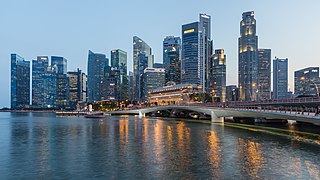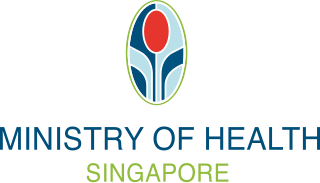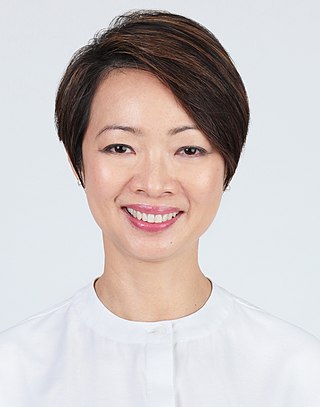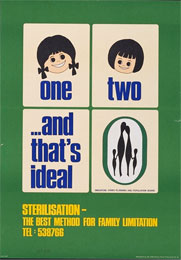Related Research Articles

The economy of Singapore is a highly developed free-market economy with dirigiste characteristics. Singapore's economy has been previously ranked as the most open in the world, the joint 4th-least corrupt, and the most pro-business. Singapore has low tax-rates and the second-highest per-capita GDP in the world in terms of purchasing power parity (PPP). The Asia-Pacific Economic Cooperation (APEC) is headquartered in Singapore.

Goh Chok Tong is a Singaporean former politician who served as the second Prime Minister of Singapore between 1990 and 2004, and Secretary-General of the People's Action Party between 1992 and 2004. He was the Member of Parliament (MP) for Marine Parade SMC between 1976 and 1988, and Marine Parade GRC between 1988 and 2020.
Health insurance or medical insurance is a type of insurance that covers the whole or a part of the risk of a person incurring medical expenses. As with other types of insurance, risk is shared among many individuals. By estimating the overall risk of health risk and health system expenses over the risk pool, an insurer can develop a routine finance structure, such as a monthly premium or payroll tax, to provide the money to pay for the health care benefits specified in the insurance agreement. The benefit is administered by a central organization, such as a government agency, private business, or not-for-profit entity.
A medical savings account (MSA) is an account into which tax-deferred amounts from income can be deposited. The amounts are often called contributions and may be made by a worker, an employer, or both, depending on a country's laws.

The Ministry of Health is a ministry of the Government of Singapore responsible for managing the public healthcare system in Singapore.

The Central Provident Fund Board (CPFB), commonly known as the CPF Board or simply the Central Provident Fund (CPF), is a compulsory comprehensive savings and pension plan for working Singaporeans and permanent residents primarily to fund their retirement, healthcare, education and housing needs in Singapore.

The Ministry of Education is a ministry of the Government of Singapore responsible for the formulation and implementation of policies related to the education in Singapore.

Singapore maintains an active conscription system in accordance with the regulations set by the Government of Singapore, known as National Service (NS). This requires all qualified male Singaporean citizens and second-generation permanent residents to serve a period of active duty military service in the uniformed services.

A multitude of languages is used in Singapore. It consists of several varieties of languages under the families of the Austronesian languages, Dravidian languages, Indo-European languages and Sino-Tibetan languages. The Constitution of Singapore says the national language of Singapore is Malay. This plays a symbolic role, as Malays are constitutionally recognised as the indigenous peoples of Singapore, and it is the government's duty to protect their language and heritage. The constitution also states that the four commonly used languages of Singapore are English, Chinese, Malay and Tamil, with the lingua franca between Singaporeans of different races being English, the de facto main language. Singaporeans often speak Singlish among themselves. Singlish is an informal, colloquial form of English that is used in Singapore. Linguists define it as Singapore Colloquial English.
The California Medical Assistance Program is the California implementation of the federal Medicaid program serving low-income individuals, including families, seniors, persons with disabilities, children in foster care, pregnant women, and childless adults with incomes below 138% of federal poverty level. Benefits include ambulatory patient services, emergency services, hospitalization, maternity and newborn care, mental health and substance use disorder treatment, dental (Denti-Cal), vision, and long-term care and support. Medi-Cal was created in 1965 by the California Medical Assistance Program a few months after the national legislation was passed. Approximately 15.28 million people were enrolled in Medi-Cal as of September 2022, or about 40% of California's population; in most counties, more than half of eligible residents were enrolled as of 2020.
The Edusave programme is part of a scheme implemented for education in Singapore by the Ministry of Education (MOE) for Singapore. Its stated aim is to maximise opportunities for all Singaporean children. The scheme aims to reward students who perform well or who make good progress in their academic and non-academic work, and provides students and schools who qualify with funds to pay for enrichment programmes or to purchase additional resources. It is applicable to Singaporeans between the age of 6 and 16 and studying full-time at government, government-aided or independent schools, junior colleges (JC) and Centralised Institutes (CI), Institute of Technical Education (ITE) or special education schools.
Goods and Services Tax (GST) in Singapore is a value added tax (VAT) of 8% levied on import of goods, as well as most supplies of goods and services. Exemptions are given for the sales and leases of residential properties, importation and local supply of investment precious metals and most financial services. Export of goods and international services are zero-rated. GST is also absorbed by the government for public healthcare services, such as at public hospitals and polyclinics.
Koreans in Singapore consist mainly of South Korean expatriates. The community formed a population of 21,406 as of 2019, according to South Korea's Ministry of Foreign Affairs and Trade, making them the world's 18th-largest Korean diaspora community. Their population has grown by about 60% since 2007. Many South Koreans living in Singapore are usually expatriates, consisting of 40-45% of the community, self-employed or Korean business owners consisting of 30% and students consisting of 20%.

Healthcare in Singapore is under the purview of the Ministry of Health of the Government of Singapore. It mainly consists of a government-run publicly funded universal healthcare system as well as a significant private healthcare sector. Financing of healthcare costs is done through a mixture of direct government subsidies, compulsory comprehensive savings, national healthcare insurance, and cost-sharing.

Foo Mee Har is a Malaysian-born Singaporean politician and businesswoman. A member of the governing People's Action Party (PAP), she has been the Member of Parliament (MP) representing the Ayer Rajah–Gek Poh division of West Coast GRC since 2011.

Lawrence Wong Shyun Tsai is a Singaporean politician, economist and former civil servant who has been serving as Deputy Prime Minister of Singapore since 2022, Minister for Finance since 2021, Deputy Secretary-General of the People's Action Party since 2022, and Chairman of the Monetary Authority of Singapore since 2023. He has been the Member of Parliament (MP) representing the Limbang division of Marsiling–Yew Tee GRC since 2015, and previously the Boon Lay division of West Coast GRC between 2011 and 2015.

Population planning in Singapore has reflected various policies to both slow and boost the growth rate of Singapore's population. Singapore first began population planning initiatives in an attempt to slow and reverse the rapid increase in births that began after World War II. Later on, from the 1980s, policy was tailored towards growth, attempting to encourage mothers to have more children. In 2020, the annual total population growth rate in Singapore was -0.3%, and its resident total fertility rate (TFR) was 1.10, below the replacement rate of 2.1.
Professor Lord Darzi's review of the NHS in 2008 introduced the idea of personal health budgets (PHBs) in the English National Health Service. Since October 2014 people eligible for NHS Continuing Healthcare were given the legal right to have a personal health budget. NHS England’s Five Year Forward View called for a ‘major expansion’ of the scheme. NHS Choices describes personal health budgets as a way "to give people with long-term conditions and disabilities greater choice and control over the healthcare and support they receive."

The Silver Support Scheme Act 2015 is a statute of the Parliament of Singapore that implements the social security Silver Support Scheme in Singapore. The law supplements the retirement savings of the needy elderly, to help them cope with their living expenses.
The Merdeka Generation Package (MGP) is an S$8 billion package announced by the Government of Singapore at the 2018 National Day Rally, aimed to assist Singaporeans born in the 1950s with their active ageing and reduce medical bills as they age. The MGP is a spinoff from the Pioneer Generation Package which benefitted the pioneering generation of Singaporeans.
References
- ↑ "Costs and Financing" . Retrieved 26 March 2018.
- ↑ "Singapore Budget 2014 Annex B-1: Pioneer Generation Package" (PDF). Retrieved 27 March 2018.
- ↑ Lai, Linette (20 February 2018). "Singapore Budget 2018: Senior care services to come under Health Ministry". The Straits Times. Retrieved 26 March 2018.
- ↑ Neo, Chai Chin (21 February 2014). "Budget 2014: Pioneer Generation to benefit 'for the rest of their lives". Today. Retrieved 26 March 2018.
- ↑ "Singapore Budget 2014, at a glance" (PDF). Retrieved 28 March 2018.
- ↑ "Community Health Assist Scheme" . Retrieved 28 March 2018.
- ↑ "Bulk of clinics are in CHAS scheme" . Retrieved 28 March 2018.
- ↑ "This is how the government is spending $9 Billion on Pioneer Generation". 28 February 2014. Retrieved 28 March 2018.
- ↑ Othman, Liyana (13 August 2016). "More Pioneer Generation citizens aware of PGP thanks to taskforce". Channel News Asia. Retrieved 26 March 2018.
- ↑ "Personalising explanations of Pioneer Generation package". 11 November 2016. Retrieved 28 March 2018.
- ↑ "Pioneer Generation Package Outreach Efforts" . Retrieved 28 March 2018.
- ↑ "Public Communication Initiatives" . Retrieved 28 March 2018.
- ↑ "Pioneer Generation Package Outreach Efforts" . Retrieved 28 March 2018.